Lightning Returns PS3 Review: Not the Future of Final Fantasy, Just an Intriguingly Weird Present
The Final Fantasy XIII saga continues to be tremendously polarizing and occasionally somewhat baffling. But on the other hand, this final entry plays better than ever.
This article first appeared on USgamer, a partner publication of VG247. Some content, such as this article, has been migrated to VG247 for posterity after USgamer's closure - but it has not been edited or further vetted by the VG247 team.
Primary Reviewer, Jeremy Parish
The Final Fantasy series has been through so many ups and downs in the past decade that with each new release critics and fans alike pick over the game to decipher what it means for the franchise's future -- and Square Enix's -- with the fevered determination of ancient priests reading bird entrails.
But, look: If anyone tells you they can suss anything about the future from Lightning Returns, the improbable third chapter of the Final Fantasy XIII saga, they're lying. The circumstances behind this game's existence are so specific, so convoluted, and so mercifully impossible to reproduce that Lightning Returns not only doesn't say anything about the future of Final Fantasy, it barely says anything about its present. For that matter, it doesn't say much anything about its own past, either; despite being the second sequel to FFXIII, it contains only the most tenuous threads connecting it to its predecessors.
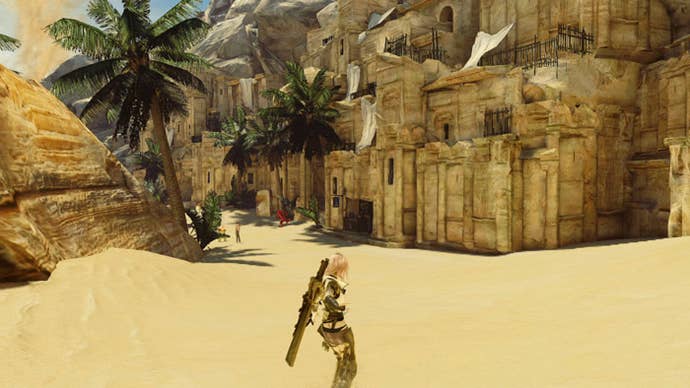
Like I said after playing the game at last year's Tokyo Game Show, Lightning Returns is the opposite of Final Fantasy XIII. That, as it turns out, is true in both good and bad ways. Whatever your feelings about FFXIII, it was absolutely beautiful and remains one of the best-looking games of the previous generation. But that beauty came at the expense of player freedom and a sense of proper world-building (sorry, game designers everywhere, datalog entries do not constitute proper world-building): Features that go hand-in-hand with RPGs. FFXIII's art, tech, and story took so long to come together that the actual game design lagged behind, amounting to little more than a 40-hour march through a series of linear corridors. This was as much a technological choice as a creative one -- the game engine couldn't really handle open spaces, so the designers instead put players in a tunnel surrounded by utterly dazzling scenery that you could see but not touch.
Well, Lightning Returns goes the opposite direction. It takes that engine, so terrible at rendering open worlds, and applies it to the largest free-roaming settings Final Fantasy has ever seen outside of the massively multiplayer installments. You can practically hear the tech creaking from the stress as you stand atop a tall desert dune and drink in distant vistas in all directions. After about 25 hours of play, I started to notice a touch of input lag in menus, just like what happens with Elder Scrolls games as your choices begin piling up. And even as the game wheezes to keep up with all that its free-roaming design demands of it, the visual splendor of FFXIII is nowhere to be seen in the game world. Objects and textures often look like something that fell out of the PlayStation 2 era; NPCs appear to be assembled out of random fragments of the protagonist's costume selections; and herky-jerky animations become almost comical in their ill-fitting awkwardness during cut scenes. Lightning Returns, not to put too fine a point on it, looks like a hot mess.
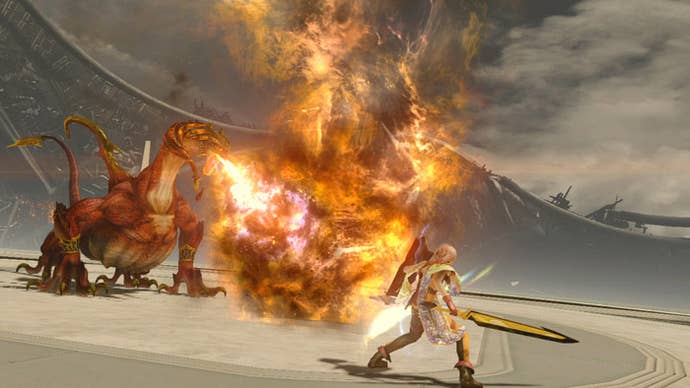
And thank god for that. FFXIII was symptomatic of everything wrong with modern-day game development practices, and a poster child for why Japanese developers have struggled with high-definition games. It's not a matter of talent (seriously, add some post-processing effects and FFXIII holds up, visually, to practically anything on one of the new consoles) but rather of management structure and mishandled planning. FFXIII was built on proprietary technology that changed midway through development, constructed around a story whose main purpose to string cool-looking full-motion videos together, stood as the centerpiece of a sweeping business venture that collapsed under its own ambition, and treated the actual game portion almost as an afterthought. There's an infamous anecdote about a visual artist for FFXIII who spent two weeks working on a single rock because no one told her what else to do. Even if that's apocryphal, it certainly fits into the game's behind-the-scenes narrative believably enough. And Lightning Returns, for all its flaws, exists as far from that utterly backward approach to game design as possible.
Where FFXIII felt like a game bolted onto a movie at the last second, with over-engineered systems seemingly designed to obfuscate the fact that the whole thing seriously lacked substance, Lightning Returns suffers the opposite problem: It gives the impression that no idea was considered too weird or ridiculous to be included, and that the developers refused to throw away a single concept that came up during planning sessions. How else do you explain the fact that your quest to save the world from annihilation has you fighting in a coliseum to win a pretty dress so you can commit arson with fireworks? Why else would you spend several hours hunting for chocobo medicine while people treat a giant bird as a holy herald of Valhalla with a totally straight face? If you want, Lightning can dress up as Lara Croft or wear a dress made of stuffed Moogles. Apparently a great many things stuck to the wall while this game was under construction.
Lightning Returns gives the impression that no idea was considered too weird or ridiculous to be included, and that the developers refused to throw away a single concept that came up during planning sessions
And let's not even talk about Lightning herself. Always a reserved, cynical character (that was originally part of her appeal, in fact), here she's downright apathetic. Literally; her personality this time around is that she has no personality whatsoever. Unfortunately, this clashes horribly with the weird, borderline-fetishistic dress-up mechanics behind the game's skill systems. It's hard to take voice actress Ali Hillis' affectless line readings seriously when she's spouting them off while wearing what amounts to a strappy leather bikini accented by a fake mustache, or spinning propellor on the top of her head, or whatever other ridiculous adornments you inflict on the poor woman. Lightning Returns wants to impress on you the fact that its story is very, very serious, but how can you buy into it when it doesn't take itself very seriously?
To make matters worse, that oh-so-weighty story borders on total nonsense. That's probably to be expected from a plot that has to put a bow on the babbling incoherence of FFXIII-2, but honestly the whole thing reads like a particularly fevered flavor of Final Fantasy fan fiction. All the nonsense about gods and Chaos from the first two games has somehow ended up locking the last remnants of the vanishing world (remember all that foofaraw about Pulse and Cocoon in FFXIII? Lightning Returns sure doesn't) into a 500-year stasis before it vanishes altogether (due to happen a week out from the game's beginning, though you can add time to the countdown by completing sidequests). Lightning is supposed to save humanity, a task which somehow hinges exclusively on the major named characters from the first two games.
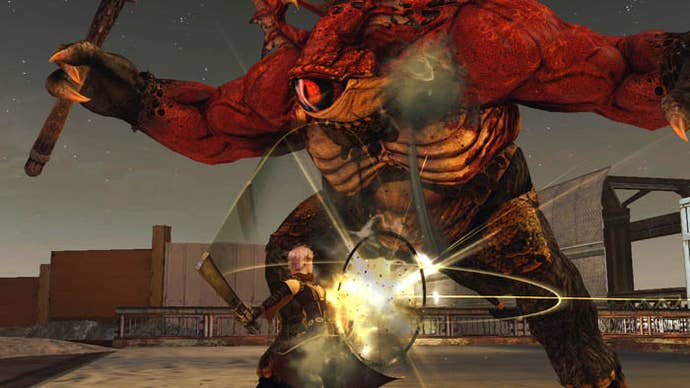
It's all pretty dumb, and yet... somehow, Lightning Returns works despite itself. Despite its clumsy misuse of dated technology, despite its woeful mishandling of its eponymous heroine, despite a story that wobbles at the border between incoherent and plain ol' stupid, the game works. I can certainly understand if most people don't stick around to reach the point where it clicks; the FFXIII trilogy to date hasn't done much to win over the hearts of long-time Final Fantasy fans, and Lightning Returns takes quite a while to come into its own (another spiritual similarity to FFXIII, I suppose). But eventually, the game stops teetering at the brink of total disaster and totters back into a sort of compelling groove. For me, it happened at about the 10-hour mark; everything finally started to click into place and it went from being a hot mess to an entertaining one. Don't get me wrong -- Lightning Returns never quite stops being something a mess. But it does work, albeit on its own messy, ridiculous, inexplicable terms.
I can tell you now that if you're the sort of person who plays RPGs for their stories rather than the other stuff, you're probably better off not even bothering with Lightning Returns. But if you like that other stuff more -- running around, discovering things, growing stronger, killing monsters -- Lightning Returns has more to offer than any entry in the franchise since Final Fantasy XII. Once again, it comes down in large part to the excellent combat mechanics. The battle system doesn't much resemble that of FFXIII and FFXIII-2; those games saw players issuing general commands to a party of warriors with a hands-off approach, whereas Lightning Returns is almost like an action RPG, with Lightning fighting (mostly) solo in real-time against groups of enemies. Nevertheless, it somehow manages to incorporate a lot of concepts from the first two entries of the series and rework them into a totally new form, and the end result come together more gracefully than you might expect.
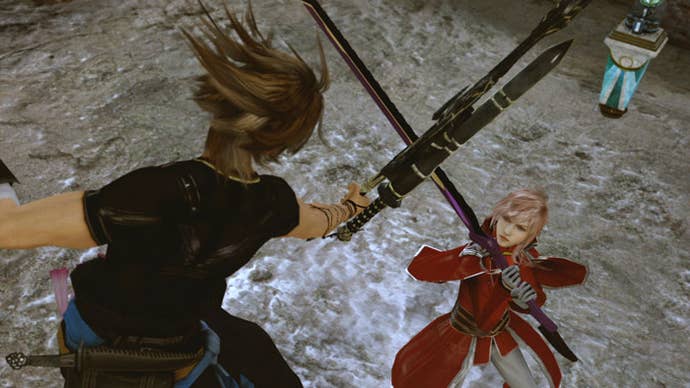
Most importantly, Lightning Returns retains the "Stagger" mechanic that causes effective attacks to greatly weaken an enemy and leave it temporarily vulnerable. It works much the same way here, except that while you're pushing an enemy toward its breaking point, you're also forced to defend against its attacks (and those of other foes), and defending draws on the same pool of action points as your own attacks. Powerful spells may deal heavy damage to a monster, but usually a rapid succession of weaker magical projectiles will build its Stagger meter more quickly. Elemental factors, buffs, debuffs, and physical attacks also factor in as well. You can fuse spells to level them up in a system that resembles a properly fleshed-out version of FFXIII's weapon-augmentation mechanics. Meanwhile, you're limited to fielding just 12 different abilities at a time (four for each of the three "schemata" costumes you can switch between on the fly), and both melee strikes and guarding count toward those 12 slots. You can't simply wade into battle with a full assortment of skills but rather have to customize your abilities to match the needs of a given situation.
The switch to an action-RPG style creates surprising new dynamics for familiar enemies. Some work like you'd expect; those armadillo-like creatures with nearly indestructible shells once again require you to stagger them with magic so their armor shatters and leave the tender creature inside vulnerable to melee strikes. But others, like the bizarre Flanitor slime-monsters that prioritize healing their allies above all else, allow you to use their behavior against them. The emphasis on proximity and positioning in combat means that when they start clustering together to cure their companions, you can blast them with an area-of-effect spell to make short work of them. By mastering the timing of Lightning's skills, you can interrupt or evade enemy attacks, too. Some spells chain into combos that end with her leaping backward, a quirk you can use to jump clear of enemy attacks. There's a respectable amount of flexibility and strategy involved in the combat; while it's not quite the DmC-come-lately some people have painted it as, it's certainly the most action-oriented battle system ever to appear in Final Fantasy, and it's great.
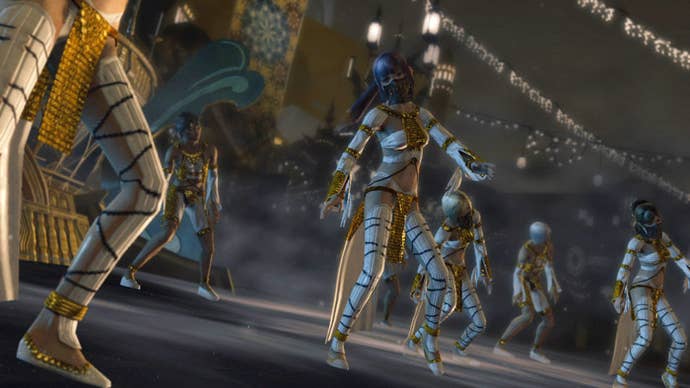
Crucially, healing for Lightning herself comes at a premium here. There's only one curative spell, which exists outside of your standard powers and draws on a separate pool of resource points (EP, which also allows you to do things like freeze time, warp across the world instantly, and more); and you can only carry six items at a time to begin with, which includes curative, resurrection, and stat-affecting supplies. In easy mode, this isn't too tough -- Lightning slowly heals between battles, and any time you get in over your head you can freely use the Escape power to reset yourself to the instant before your current encounter -- but on higher difficulty levels, there's a constant drain on the heroine's health that really creates a harrowing sense of risk.
This, on top of the constant march of time that threatens to unravel the world, creates a successful tension with the freedom that the game world offers. The combination can sometimes feel frustrating, when the clock is winding down and you're expected to comb the streets in search of key items or info that has been scattered about without a single clue to its whereabouts, but it allows the game to tap into the primal anxiety of the likes of Dead Rising, Dragon Quarter, and Valkyrie Profile -- fittingly, given Valkyrie Profile creators tri-Ace's involvement with the game. Although their role was evidently more on the technical side than design, Lightning Returns feels a lot like a tri-Ace joint: An experimental B-tier RPG with more big ideas than polish to back them up.
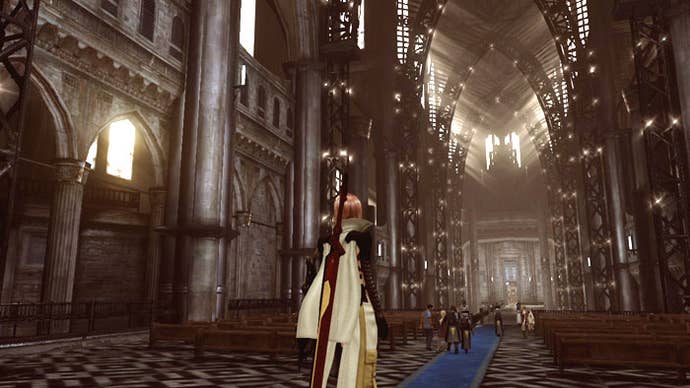
And despite the whole affair's slightly janky feeling, every once in a while it rises above mere B-game status to give a glimpse of the classic Final Fantasy spirit. You'll catch loving attention to detail in the damnedest places, such as that bit with the fireworks, which features a meticulously choreographed and convincingly imperfect dance troupe leading into a brief stage performance by Lightning that explodes into visual chaos. In such brief moments, the game recaptures the "screw it, we're doing it on our own terms, and it's going to be spectacular" attitude that made the series so must-see in the PlayStation era. The rest of the time, though, you're watching Lightning talk to stiffly gesticulating NPCs wearing bizarre accessories. It's a weird mishmash of ideas, moods, and mechanics, and ultimately it only just barely works. But it does work, even if it does so despite itself.
Second Reviewer, Pete Davison
Although Square Enix had been teasing Lightning Returns for a while — and I even had a chance to play the game's opening segments at EGX last year — I really wasn't quite sure what to expect from it.
If I'm honest, the last thing I thought it would turn into is what we've got here — an intriguing, sprawling, open-world adventure packed with secrets, peculiar little game mechanics and an extremely unforgiving nature. Given FFXIII's much-lambasted amount of player hand-holding, I was especially surprised to discover very early on in Lightning Returns that the game has no qualms about allowing you to fail things, and then making you feel terrible about having done so. Promise a little girl that you'll find her green Carbuncle doll, for example, then bring her back a red one to see what happens (since the green one appears to be nowhere to be found) and Lightning will summarily inform you — after the girl goes borderline insane with grief — that your actions have effectively doomed her soul to oblivion. Nice. Just to make you feel worse, the game then auto-saves immediately after this has happened to prevent any save-scumming. You are a terrible person. Deal with it.
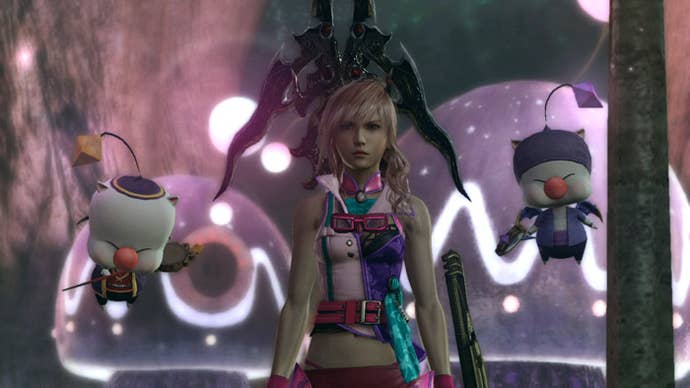
There's a certain charming clunkiness about the world that Jeremy's already touched on, but despite the number of NPCs who inexplicably break into high-speed runs, stare at walls and fall off things in unintentionally amusing manners, there's a real sense of life and place about Lightning Returns' locales that simply wasn't present in the original FFXIII in particular; although I'm one of the few people who actually liked that game, I constantly felt disconnected from the world and found it difficult to visualize how different areas related to one another geographically. I've had no such issue with Lightning Returns, which, although working with an engine that's clearly struggling to realize its creators' ambitions, does a much better job with building a coherent, interesting world to explore.
This is partly helped along by the time mechanic which, although putting a hard cap on quite how long you can spend hunting down shiny objects scattered on the floor — everyone in Nova Chrysalis has gaping holes in their pockets, it seems — gives you a strong feeling of the world going about its business even if you're not directly interacting with it. People wander around, NPCs show up at certain times, shops open and close. You can freeze time with Lightning's handy Chronostasis ability, but it's a temporary reprieve; before long, the clock will be ticking again, and you'll have to work out how best to use the hours you've got left. There's plenty of work to be done.
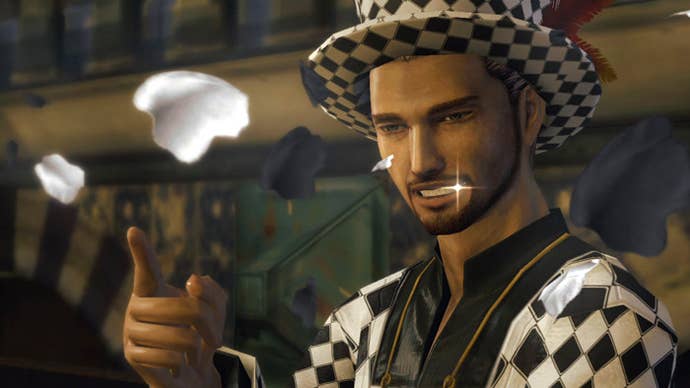
Lightning Returns is not what you might expect from a game carrying the Final Fantasy brand — but then, it's arguable as to whether Final Fantasy has meant what its critics think it means ever since XIII released. With Bravely Default proudly flying the flag for the traditional Final Fantasy model, that leaves the mainline series and its side stories to branch off on crazy diversions like Lightning Returns — and judging by how interesting this game is to play, despite its flaws and rough edges, I for one welcome this degree of exploration and creativity, and personally I hope we do see more like it in the future.
The Breakdown:
- Graphics: Battles are glorious exercises in visual overload, with detailed monsters, intricate costumes for Lightning, and the requisite stunning spell effects (just watch those tiny ice chips spin away after you cast Blizzaga!). Everything outside of battle, on the other hand...
- Audio: Voice acting is pretty uneven, and the fact that you can tell it's the same handful of voice actors playing multiple roles doesn't help. On the other hand, the music is phenomenal from start to finish.
- Interface: Thankfully, we're well past the days where Final Fantasy characters could only jump at little highlighted spots; Lightning Returns plays a lot like an action-RPG (though it's a far cry from its obvious inspiration, Assassin's Creed). The only other Final Fantasy to have this much immediate action was Dirge of Cerberus, and this is by far the better game.
- Lasting Appeal: Though a much shorter game than FFXIII -- that time limit, you know? -- its running time is largely free of padding and nonsense (well, besides the fact that the entire plot is pretty much nonsense). And the New Game + mode makes replays inviting, especially if you fail to save the world before time runs out.
ConclusionFinal Fantasy's tortuous history over the past decade has led us to a very strange place in Lightning Returns, but for all its weirdness it actually is a pretty compelling adventure. Excellent combat mechanics and the pairing of an open world with a harsh time limit help the game overcome its technical shortcomings and impenetrable story. While this doesn't represent the future of Final Fantasy, it does at least make for a pretty entertaining diversion.
